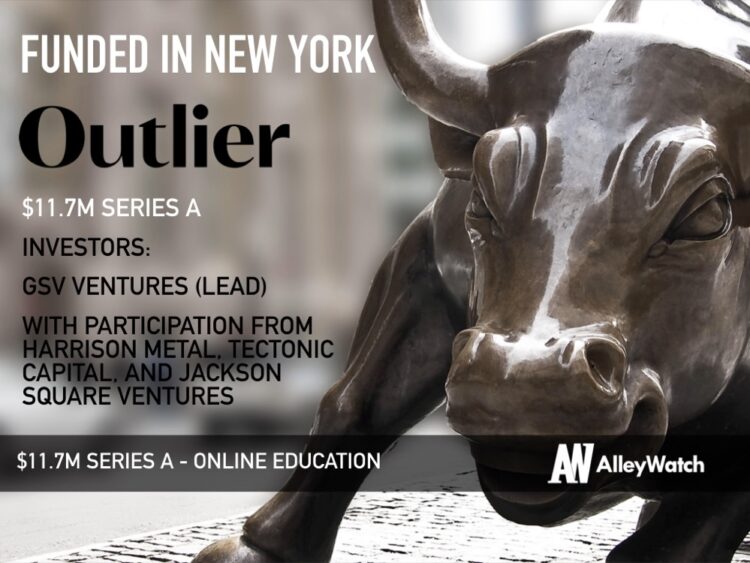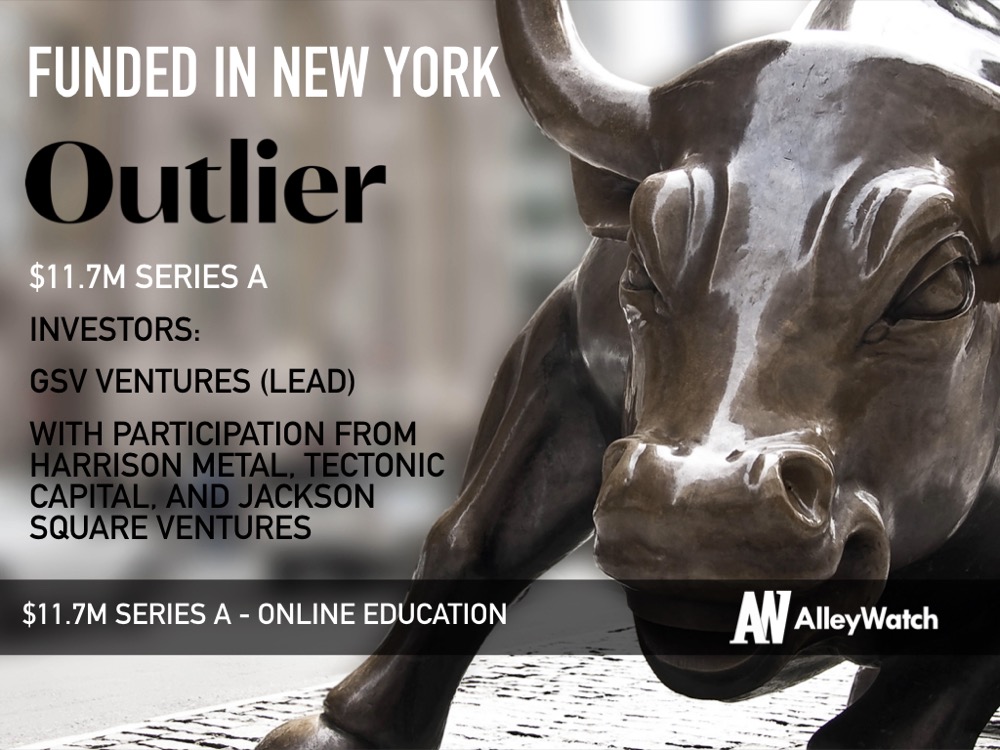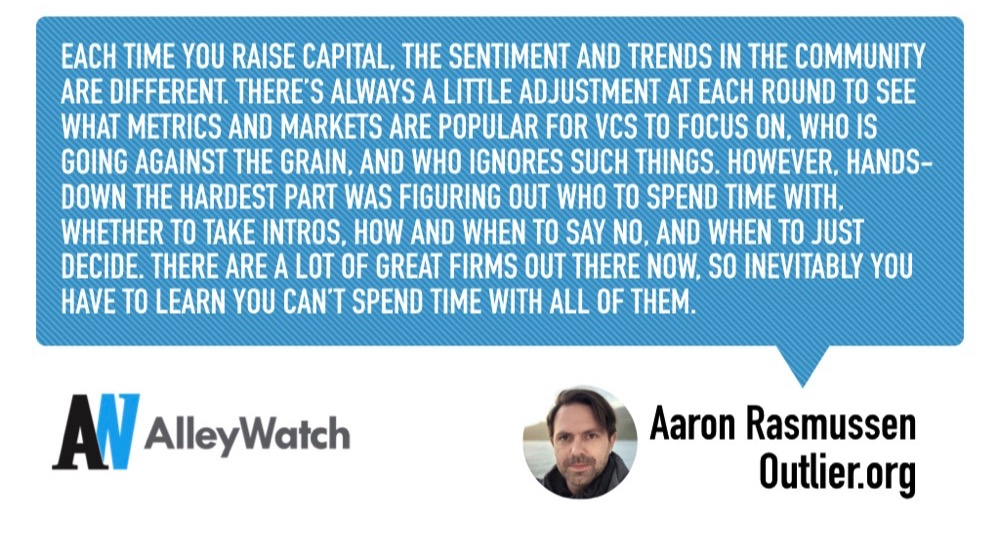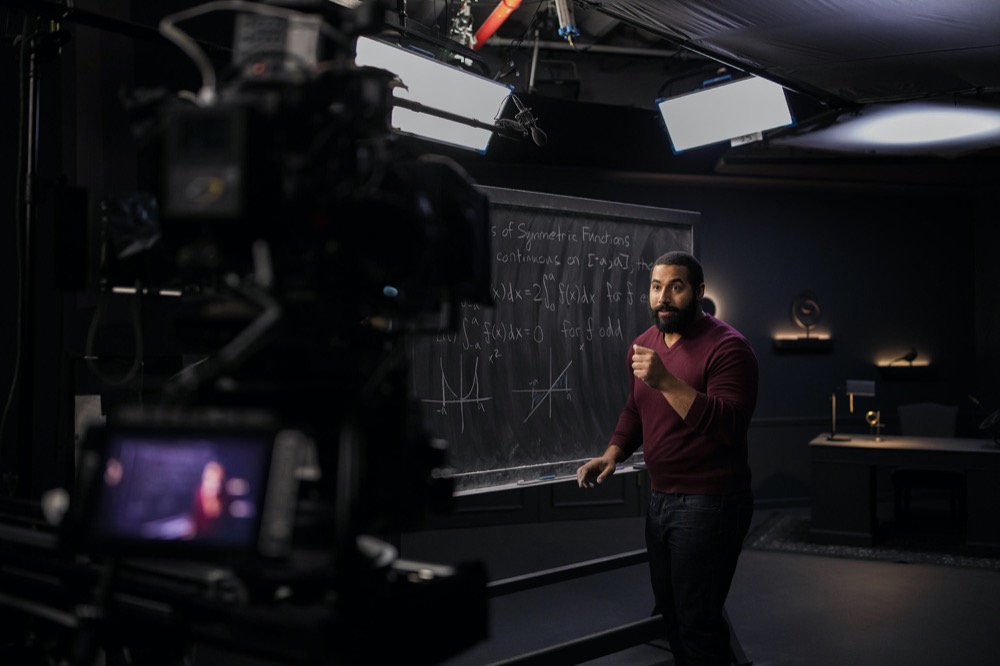With the cost of collegiate education soaring, many are questioning the value of pursuing higher education. Outlier.org is tackling this problem head-on with its online learning platform that allows students to complete entry-level courses online for credit at a fraction of the cost of traditional courses. The courses in the curriculum are gracefully designed and the platform also provides enhancements such as 1-on-1 tutoring, AI-proctored assessments, dynamically-generated problem sets, and cutting-edge active learning techniques that harness the power of technology to ensure that learning objectives are achieved.
AlleyWatch sat down with Founder and CEO Aaron Rasmussen (cofounded MasterClass) to learn more about the inspiration for Outlier.org, growth plans, and recent round of funding, which brings the company’s total funding to $16M.
Who were your investors and how much did you raise?
Outlier.org has raised $16 million in total funding. Our announcement includes a recent $11.7 million Series A round led by GSV Ventures with participation by Harrison Metal, Tectonic Capital, and Jackson Square Ventures. Harrison Metal led our previously undisclosed seed round.
Tell us about the product or service that Outlier.org offers.
Outlier.org offers engaging and beautifully-produced online courses with transferable credits granted by the University of Pittsburgh. The courses for the Fall 2019 semester and the Spring 2020 semester are Calculus I and Introduction to Psychology.
Our ultimate goal is not to replace the entire college curriculum, but to provide an affordable and flexible way for students to take the first 25 college-level courses and radically decrease student debt. For $400, about one-sixth the cost of a traditional college course, Outlier.org students enjoy a world-class learning experience that includes access to 1-on-1 tutoring, AI-proctored assessments, dynamically-generated problem sets, and cutting-edge active learning techniques.
 What inspired the start of Outlier.org?
What inspired the start of Outlier.org?
I grew up in a large family living in rural Oregon. My father was a science teacher. I was lucky enough to attend Boston University on a Pell grant, and took community college courses over the summers and transferred them in to save money.
After cofounding and leading the creative direction of MasterClass, I took some time off and traveled. As I thought about what I was going to do next, a blog post that I had read by MIT professor Woodie Flowers kept popping into my head. Every year, around one million U.S. college students take Calculus I. On average, that course costs about $2,500. So Calculus I, alone, costs college students $2.5 billion each year. The kicker? About 40% of those students fail. Not only do we spend $2.5 billion, annually, on one college course, but we also waste $1 billion in the form of those failures.
We looked at the top 25 courses in college by student population, which, besides calculus, include psychology, physics, chemistry, and micro-economics. All together, these courses account for about $50 billion in student spending a year.
With Outlier.org, our goal is to create the greatest for-credit online classes ever made and provide them at an accessible and affordable price. We are dedicated to student success. Unlike the status quo in which students can pay thousands of dollars for credits that they never receive if they fail, we guarantee ROI, providing a full refund if a student does all the work and does not pass. Students should not be paying to be taught at, but to learn.
How has your experience building MasterClass impacted the trajectory of this business?
I am really proud of my work with MasterClass and what we built there. That being said, the two platforms are very different. MasterClass lessons were designed to capture and share knowledge that you cannot really find anywhere else besides the minds of these celebrity masters, while Outlier courses are designed to fully teach you an academic subject based on learning outcomes. What I did take away from MasterClass was validation that quality matters and that consumers want and will pay for well-crafted and well-delivered education.
How is Outlier.org different?
Typically, online educational content has been, to put it bluntly, ugly and unengaging. Our goal with Outlier.org is to make courses that are as beautiful as a theatrical movie and match the design and user interface expectations that today’s young learners are accustomed to in their daily lives, keeping them engaged and encouraging their success. Watching a poorly-produced online class is akin to being in a classroom that is too cold – your learning experience is negatively impacted by a factor that has nothing to do with the content. With an effective user interface, designed in dark mode to reduce strain on the eyes, and cinema-quality lessons that visually engage the viewer, we are addressing a key area that has been ignored for far too long in online education.
Typically, online educational content has been, to put it bluntly, ugly and unengaging. Our goal with Outlier.org is to make courses that are as beautiful as a theatrical movie and match the design and user interface expectations that today’s young learners are accustomed to in their daily lives, keeping them engaged and encouraging their success. Watching a poorly-produced online class is akin to being in a classroom that is too cold – your learning experience is negatively impacted by a factor that has nothing to do with the content.
We also make credits as easy as possible to transfer through our partnership with The University of Pittsburgh, a top 100 university.
What market does Outlier.org target and how big is it?
As I mentioned earlier, Calculus I alone is a massive market with $2.5 billion spent annually on the course. If you look at the first twenty-five introduction courses in college, it adds up to around a $50 billion market.
Our primary target demographic is 17-20-year-olds in need of basic college credits, who are also looking for the most time and cost-effective solution. Our secondary market consists of people who are looking to continue their education. That means anyone who is older and is looking to complete their degree, retrain for another career, or simply learn something new in-depth.
What’s your business model?
Our business model is fairly straightforward – we offer our classes for a flat rate of $400, providing a full refund if a student does all the work and does not pass.
What was the funding process like?
The initial seed was from Michael Dearing, and he was my first and only conversation on it. He is similarly passionate about education, and I was lucky enough to work together with him for years during the MasterClass journey.
I was absolutely blown away by the inbound response from the investment community when it came to the launch of the company and the Series A. It was encouraging to see how excited VCs get when a mission they care about overlaps with a major market opportunity.
What are the biggest challenges that you faced while raising capital?
Each time you raise capital, the sentiment and trends in the community are different. There’s always a little adjustment at each round to see what metrics and markets are popular for VCs to focus on, who is going against the grain, and who ignores such things. However, hands-down the hardest part was figuring out who to spend time with, whether to take intros, how and when to say no, and when to just decide. There are a lot of great firms out there now, so inevitably you have to learn you can’t spend time with all of them.
What factors about your business led your investors to write the check?
Improving the state of higher education is a matter that is very near and dear to many of our investors, and they take great pride in upholding our mission. With $1.6 trillion in student debt stunting the futures of millions of Americans nationwide, investors are eager to jump in when they hear about a solution that is actually poised to make a change.
On the business side, Outlier.org has come up with an infinitely scalable solution that is engaging, effective, and inexpensive. We have created a replicable process of collaborating with professors, specialists, and traditional institutions that allows us to seamlessly expand Outlier.org’s offerings and essentially remove the upper limit on class size without sacrificing student success. It doesn’t hurt that the market is massive and global and we’ve developed production techniques that can produce high-quality content at a very low cost that allows for iteration.
What are the milestones you plan to achieve in the next six months?
With the Spring 2020 semester kicking off in mid-January we will be laser-focused on ensuring student success over the next 14 weeks, which involves collecting feedback and addressing comments to continue improving our process. Beyond that, we are creating more courses and hiring, hiring, hiring.
What advice can you offer companies in New York that do not have a fresh injection of capital in the bank?
My first company was bootstrapped, so I’ve put in my years of hand-to-mouth. It’s all about keeping fixed costs low and finding revenue where you can as you solve whatever you need to figure out before going out to investors. That can mean going a little slower than you wanted to, and that’s okay. Sometimes the clever ways you figure it out can be a great hook for investors to raise capital. We all know the AirBnB cereal story. Also, move to Brooklyn 😉
Where do you see the company going now over the near term?
After having a successful pilot program with the University of Pittsburgh in the Fall 2019 semester, we are extending our partnership into Spring and Summer 2020. We are currently accepting enrollment for Spring 2020, which will begin on January 13th, 2020. We’ll be creating new courses, refining the ones we have, growing the team, and experimenting.
What’s your favorite restaurant in the city?
If there is one thing New York isn’t short on, it’s amazing food. Properly in the city, I love Gaia Italian Cafe on Houston.
Nominations are now open for AlleyWatch’s 2020 NYC Tech Influencers feature.
Know someone amazing who belongs on this list? Nominate them today here. Nominations open until 2/4. Looking to drive targeted response from the NYC Tech community at scale, learn more about partnering with AlleyWatch on this initiative here.






